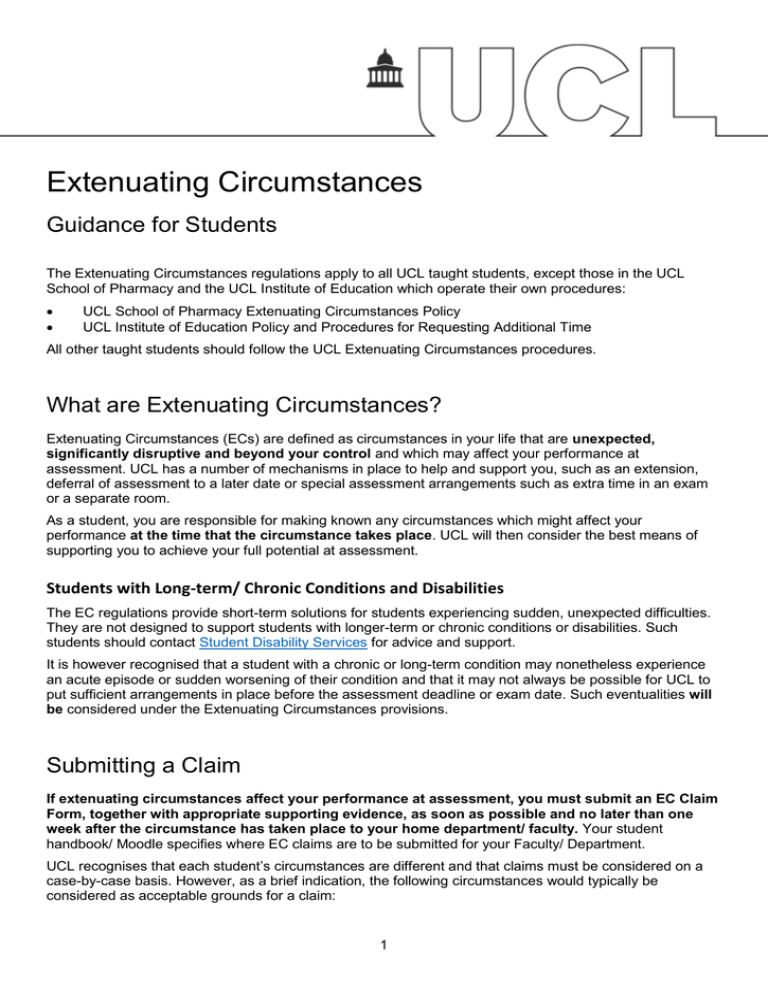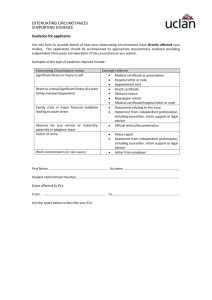Extenuating Circumstances Guidance for Students
advertisement

Extenuating Circumstances Guidance for Students The Extenuating Circumstances regulations apply to all UCL taught students, except those in the UCL School of Pharmacy and the UCL Institute of Education which operate their own procedures: UCL School of Pharmacy Extenuating Circumstances Policy UCL Institute of Education Policy and Procedures for Requesting Additional Time All other taught students should follow the UCL Extenuating Circumstances procedures. What are Extenuating Circumstances? Extenuating Circumstances (ECs) are defined as circumstances in your life that are unexpected, significantly disruptive and beyond your control and which may affect your performance at assessment. UCL has a number of mechanisms in place to help and support you, such as an extension, deferral of assessment to a later date or special assessment arrangements such as extra time in an exam or a separate room. As a student, you are responsible for making known any circumstances which might affect your performance at the time that the circumstance takes place. UCL will then consider the best means of supporting you to achieve your full potential at assessment. Students with Long-term/ Chronic Conditions and Disabilities The EC regulations provide short-term solutions for students experiencing sudden, unexpected difficulties. They are not designed to support students with longer-term or chronic conditions or disabilities. Such students should contact Student Disability Services for advice and support. It is however recognised that a student with a chronic or long-term condition may nonetheless experience an acute episode or sudden worsening of their condition and that it may not always be possible for UCL to put sufficient arrangements in place before the assessment deadline or exam date. Such eventualities will be considered under the Extenuating Circumstances provisions. Submitting a Claim If extenuating circumstances affect your performance at assessment, you must submit an EC Claim Form, together with appropriate supporting evidence, as soon as possible and no later than one week after the circumstance has taken place to your home department/ faculty. Your student handbook/ Moodle specifies where EC claims are to be submitted for your Faculty/ Department. UCL recognises that each student’s circumstances are different and that claims must be considered on a case-by-case basis. However, as a brief indication, the following circumstances would typically be considered as acceptable grounds for a claim: 1 Serious personal injury or medical condition preventing attendance at or completion of assessment or submission of work Serious worsening or acute episode of an ongoing medical condition (including pregnancy and maternity) or disability Death of, or serious injury to, a child, sibling, parent (including step-parent or legal guardian), spouse or common law partner Victim of serious crime (e.g. assault, mugging) Theft of work required for assessment Direct experience of terrorist incident or natural disaster Major fire in residence Jury Service or attendance at court If your circumstance is not in this list, you may still be able to submit a claim. Section 7.3 Acceptable Grounds for Extenuating Circumstances provides more detailed information on the types of circumstances that might be considered. Your claim must state clearly the modules/ components for which you are seeking mitigation; claims will not be considered for any modules not identified on the EC Claim Form. Your claim must also be supported by written evidence from an appropriate, verifiable and independent authority such as a registered medical practitioner. Your evidence must cover the full period for which you are claiming mitigation and must be provided in English. You can find further information about evidence in Section 7.4 Submitting a Claim. What Happens Next? Coursework Deadline Extensions of up to One Week If you request a coursework deadline extension of up to one week on your EC Claim Form, the receiving office will forward your claim to the relevant Programme Director (or equivalent), Departmental Tutor or Chair of the Programme Board of Examiners who will consider your request and respond to you as soon as is practicable. Please note that all requests must be submitted on the EC Claim Form and according to the EC procedures. Other members of teaching staff, including Module Tutors, are not permitted to grant an extension. Special Assessment Arrangements for Short-term Conditions Students with long-term, chronic conditions and disabilities will be supported by Student Disability Services and are not expected to submit an EC Claim Form in order to be considered for Special Assessment Arrangements. The EC procedures are provided as an additional mechanism to support students with short-term, sudden and unforeseen ECs who may nevertheless be able to sit an examination if special arrangements can be put in place, such as, extra time in an examination, an alternative venue, including the option of a separate room, rest breaks, specialist equipment, such as a PC or an adjustable chair, or an alternative form of assessment. If you request special assessment arrangements on your EC Claim Form, the receiving office will forward your claim to the Special Assessment Arrangements (SAA) Panel for consideration. The SAA Panel will contact you to discuss your needs further. In exceptional circumstances, for example if you are ill on the morning of an exam, the SAA Panel may be able to accept your claim for special arrangements directly. Students should contact the Examinations Team as soon as possible in such circumstances. All Other Claims All other claim forms will be forwarded to the Faculty or Departmental Extenuating Circumstances Panel who will determine the outcome of your claim: 2 The EC Panel may require you to submit further evidence. Where this is the case, you will be given two further weeks to submit the requested documentation. If nothing is received in this time frame, the EC Panel may reject your claim. The EC Panel may reject your claim if it does not, in the panel’s academic judgement, constitute acceptable grounds for a claim, or if your evidence is missing or inadequate. If the EC Panel accepts your claim it may make one of the following recommendations: i) To refer your claim to the Special Assessment Arrangements Panel ii) To offer you the opportunity to sit/ submit the assessment as if for the first time and without penalty (deferral) iii) To offer you a specified extended deadline iv) To condone the late submission of coursework (late submission penalties suspended and full mark awarded) v) To exclude the affected component from the module mark calculation, up to a maximum of 50% of a module vi) To exclude the affected module from the classification calculation, up to a maximum total of 30 credits (1 course unit) across the whole programme vii) To recommend that the Board of Examiners gives special consideration to any weighted average marks falling within the 1% Borderline Zone (see Section 2.10 Undergraduate Borderline Criteria and Section 3.9 Taught Postgraduate Borderline Criteria) viii) To recommend that you are considered under UCL’s Undergraduate Special or Aegrotat Provisions, where applicable. The EC Panel Secretary will notify you of the panel’s decision in writing within one week of the Panel meeting, giving details of the decision made and any new deadlines. Your module and programme results will be ratified at the next meeting of the Programme Board of Examiners, who will notify you of your overall results. Late Submission of a Claim If you are unable to obtain the necessary evidence within the one week deadline you should still submit your EC Claim Form on time and indicate that your evidence is to follow. However, a decision cannot be made on your claim until you submit your evidence. If you are unable to submit your claim within the specified deadline because the EC is still ongoing, and the Board of Examiners has not yet made a decision, you should still submit an EC Claim Form following the standard procedures. However, your claim will only be considered if your evidence clearly demonstrates why you were unable to submit your claim within the normal time frame. If you are unable to submit your claim within the specified deadline because the EC is still ongoing, and the Board of Examiners has already made a decision, you may be able to request a review of the Board’s decision. You will need to submit a request for review within two weeks of the date of your results notification. Your programme handbook/ Moodle will specify where EC Claims are to be submitted requests for review should be submitted to the same location. Your request will be considered by your Faculty’s Extenuating Circumstances Panel and by the Vice-Provost (Education and Student Affairs), who will let you know the outcome of your request as soon as practicable. Claims From Previous Years Students with Extenuating Circumstances ‘banked’ from previous years will still have these circumstances taken into consideration by the Board of Examiners. The 2014-15 Extenuating Circumstances regulations will apply to these students only. Any new claims made by such students will only be considered under the 2015-16 regulations i.e. no further ECs will be ‘banked’ for any student. 3
